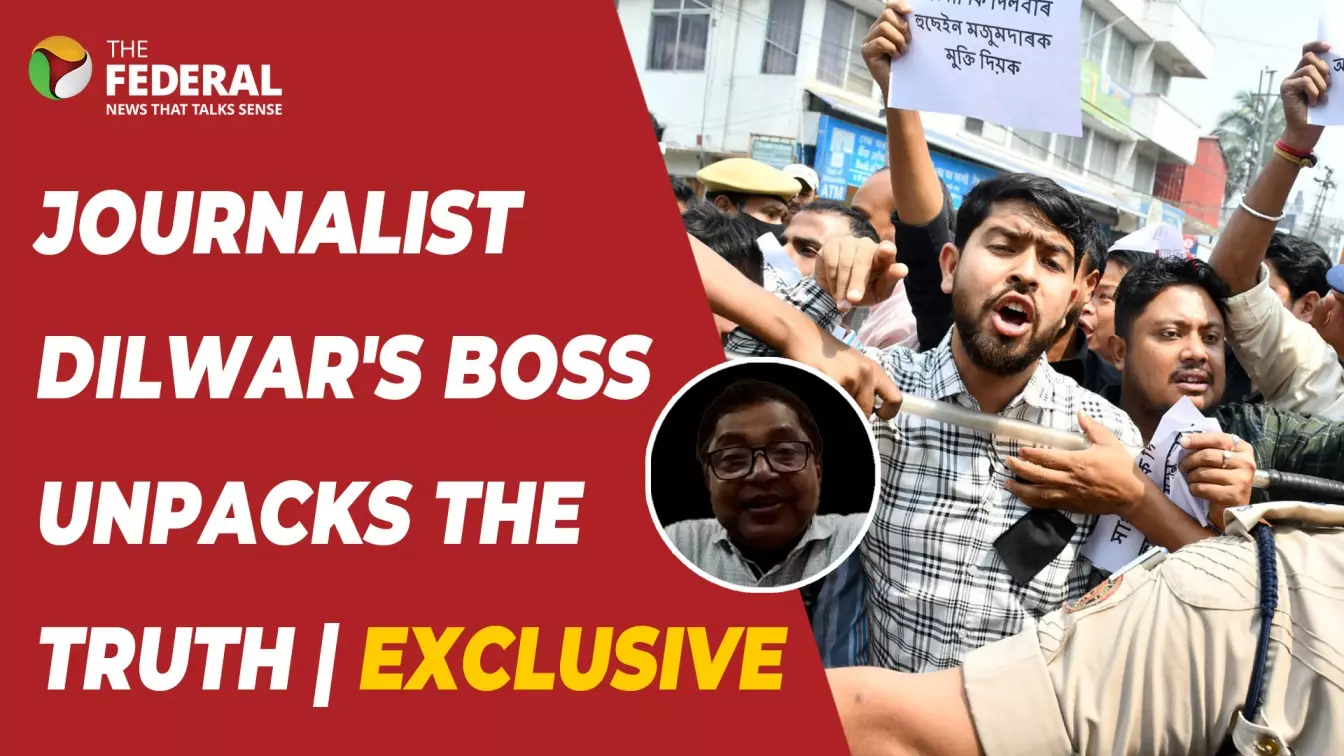
Exclusive: Arrested Assam journo’s editor reveals ‘pattern of harassment’
Mozumdar’s case isn’t isolated; over the past 4 years, those questioning the government have faced both direct and indirect threats, says Khagen Kalita

The arrest of senior journalist Dilwar Hussain Mozumdar in Assam has ignited a fierce debate over press freedom in the state.
In an exclusive interview with The Federal, Khagen Kalita, Managing Editor of The Cross Current, detailed the events leading up to the arrest and the larger pattern of intimidation faced by journalists.
With protests erupting across the state, the case has spotlighted growing concerns over the safety of media professionals in Assam.
Arrest and allegations
On March 25, Mozumdar was detained while reporting on a protest organized by the youth group Jatiya Yuva Shakti. The protest targeted Assam Cooperative Apex Bank over alleged corruption and financial misappropriation. Mozumdar was at the site to cover the demonstration when the bank’s Managing Director, Domboru Salkia, reportedly summoned him to his office.
In Kalita’s words, “Dilwar was asked by the MD to take initiatives to stop the protest. When he said he was just a journalist, not a protester, he was told to leave.” Later, police arrived and asked Mozumdar to accompany them, following a complaint by the bank alleging illegal trespassing.
Police silence and journalist outrage
Though Mozumdar voluntarily went to the police station by 1 pm, he was held until midnight without being formally arrested. “Even his lawyer and wife were not allowed to meet him,” Kalita revealed. It was only after pressure from fellow journalists and widespread outrage that the case gained visibility.
The delay in filing charges and the lack of transparency raised alarm. Kalita said, “Nobody could explain what he was being held for. We only found out through a low-level police source that the bank had filed a complaint.”
Also read: How Mozumdar's arrest became a moment of reckoning for Assam journalists
An evil pattern
Kalita said Mozumdar’s case isn’t isolated. Over the past four years, there’s been a pattern of harassment against those questioning the government. “Even people posting Facebook comments or drawing cartoons have been arrested,” he noted.
Kalita described how a local cartoonist was jailed after criticizing the cutting of century-old trees for flyover construction. “It’s not just journalists. Anyone who raises their voice is at risk,” he said.
Spontaneous protests
Mozumdar’s arrest sparked spontaneous protests across Assam. “It was a spark that lit a fire,” Kalita said. Journalists from across the state gathered at press clubs and staged demonstrations, reflecting long-standing frustrations with government pressure and media owner complicity.
Kalita pointed out that ministers often question journalists about which outlet they work for and threaten to speak to their owners. “It’s an indirect threat that affects our work,” he added.
Digital divide and deflection
Following the protests, Assam Chief Minister Himanta Biswa Sarma claimed that senior journalists from traditional media had urged the government not to recognize digital reporters. Kalita dismissed this as an attempt to divide the media fraternity.
“This is how the CM operates—by trying to pit print, TV, and digital against each other,” he said. He also accused certain media groups of being formed only to maintain political proximity, with little interest in journalistic integrity.
Also read: Assam journo held on vague grounds after trying to report on bank ‘scam’
Political links and pressure
Kalita revealed that the bank at the centre of the controversy is chaired by a BJP MLA, with CM Sarma himself on its board.
“We exposed their links with businessmen who siphoned over Rs 20 crore,” Kalita said. Though the bank threatened legal action, no case was filed as The Cross Current had already published the supporting documents.
Adding to the intimidation, Dilwar’s elder brother was recently arrested in what Kalita called a “revenge case” over alleged land grabbing. “This is clearly vindictive,” he said, pointing to a wider climate of retaliation.
Media fightback
Despite the pressure, Kalita believes the tide is turning. “Journalists are finally speaking out,” he said. He emphasized the need for solidarity and standing up to threats, adding that only a united front can push back against government intimidation.
The content above has been generated using a fine-tuned AI model. To ensure accuracy, quality, and editorial integrity, we employ a Human-In-The-Loop (HITL) process. While AI assists in creating the initial draft, our experienced editorial team carefully reviews, edits, and refines the content before publication. At The Federal, we combine the efficiency of AI with the expertise of human editors to deliver reliable and insightful journalism.

